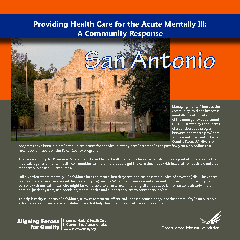Managing mental illness at the community level can keep the mentally ill out of jail and out of the emergency department (ED), illustrated by the success of a collaborative program between healthcare providers and law enforcement in Bexar County, Texas. Jail diversion programs have been in place in the United States for decades, but they have increased in the past few years, according to a recent policy report on the Bexar County program.
The Bexar County Jail Diversion Program and Crisis Mental Health System offers an example of how a joint effort involving the medical, legal, and mental health communities can help more people get the care they need with less drain on both law enforcement resources and ED resources.
Jail diversion steers mentally ill individuals into the mental health system and can ease the burden of crowded jails. The Center for Health Care Services created the diversion program in 2002 with a three-pronged intervention plan in mind: Identifying persons with mental illness who might be vulnerable to arrest, recommending alternatives to jail for persons already in the criminal justice system, and providing mental health and support services to prevent recidivism


